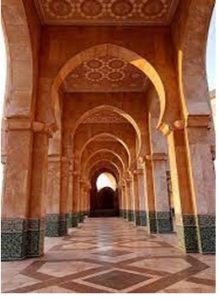Bilal, the Outrunner (Part-2)

Beginning with the previous issue of Young Muslim Digest, the life of Bilal bin Rawaha, the famous Companion of the Prophet, is being serialized in this column every month. Presented herein under is the second installment in this series taken from the brief, but significant, biography by SYED IQBAL ZAHEER.
Islam therefore, allowed the continuation of the practice, albeit grudgingly and, more or less, in retaliation. For problems of war-prisoners cannot be solved unilaterally. You may grant freedom to your prisoners, but will the enemy reciprocate in the like manner?
Again, it is on the system of slavery that largely depended trade, commerce and agriculture of those times, not only in Arabia, but all over the world. Had Islam banned slavery at one go as, for instance, it banned adultery, the system of production and distribution would have crashed. The slaves played an important role in it. As a result, the whole economy would have collapsed, (if it needed further collapsing!), and a large number of people would have died of starvation. Therefore, Islam observed gradualness in the freeing of slaves.
Additionally, it framed such rules of law, that, in time, not only did the population of slaves dwindle to near zero – except for those that were freshly taken captives in wars, and except for those sections of the people that were devoid of any human feeling and so kept slaves – but the freed slaves themselves became rulers over their former masters. The Mamluks in Egypt and the Slave Dynasty of India are good examples. Individually too, once freed, the slaves rose to great heights.
After the Companions, most of the second generation top scholars of Islam were freed slaves. A cursory glance at the early history reveals the following names: Mujahid, (the famous commentator who read the Qur’an 30 times before Ibn `Abbas), `Ataa’ (the black, one-eyed, flat‑nosed, besides whom no one was authorized to give ruling on Hajj affairs), Sa`eed b. Jubayr (another black, about whom Imam Ahmed said: “Sa`eed has died, and there is none on earth who can say that he doesn’t miss him”) and `Ikrimah (the principal juris consult of Makkah and an authoritative commentator of the Qur’an). Thus, we see that three of the most oft‑quoted, second‑generation, commentators of the Qur’an were former slaves: Mujahid, `Ataa’, Ikrimah!
To continue with the list: Ibn Sireen, (the famous Qadi and interpreter of dreams), Mak‑hul, (the Kabuli, the scholar laureate, so to say, of Syria), Nafi`, (the great legist, Ibn `Umar’s former slave, about whom Bukhari said: “`Malik‑Nafi`‑Ibn `Umar’, this is a golden chain of narrators”).
This short list is the result of a cursory glance, and one that did not take note of other freed slaves that were famous for other achievements, such as, for instance, Musa b. Nusayr, (the conqueror of Spain, who belonged to the enfranchised tribe, Lakhm), or several freed women slaves who acquired fame for one or the other achievement. (Al‑Bidaya wa an‑Nihaya and Ibn Khalikan)
Therefore, it can be said with fair confidence that the slaves in the Muslim society suffered much less. Except that they were not free – and that is to say a lot – de facto they enjoyed, more or less, the same status as a free man. A single historical incident should give us some idea of what it meant to be a slave in early Islam, if this is what it meant twelve hundred years later when the incident being quoted occurred. `Abbas Mahmood `Aqqad writes in his The Heavenly Caller, Bilal:
“Once 5,500 Greek prisoners of war were brought into Egypt. They were distributed as slaves among the rich of Cairo and Alexandria. Later, after some time, when the negotiations (with the enemy) were completed, it was ordered that all of them be released. But when the choice was given, no more than 400 of them chose to be freed and returned to their lands. The rest opted to stay back as slaves!”
 Compare this with the American situation today where freed slaves, even after 130 years of freedom, have not yet been able to unbind themselves from the shackles of poverty, ignorance and social backwardness. To this day, they suffer from the hangovers and are not at all accepted as social equals by the whites of their own faith despite the fact that it is a country where democratic norms and behavior are the strongest in the world, and where liberalism and unbiased outlook are part of the school curriculum.
Compare this with the American situation today where freed slaves, even after 130 years of freedom, have not yet been able to unbind themselves from the shackles of poverty, ignorance and social backwardness. To this day, they suffer from the hangovers and are not at all accepted as social equals by the whites of their own faith despite the fact that it is a country where democratic norms and behavior are the strongest in the world, and where liberalism and unbiased outlook are part of the school curriculum.
In contrast one cannot find a certain class in the Muslim countries – those that were formerly slave – always in the ghettos. There are poor no doubt, as there are bound to be everywhere. And some are in ghettos too. But one cannot see a permanent class bound in those ghettoes generation after generation. They have nothing to match with the Harlem district of New York which once prided in the Dutch, Germans, Irish, and all kinds of white immigrants, but now has made way for the blacks who “have decided to stay on” in its “Pig Alleys,” and the “Goat Alleys,” stuffed to its last inch of space with the “middle‑class” negroes, living in “apartments” little better than the shacks of the past, and leading “honorable” lives as janitors, garbage collectors, waiters, garage attendants, gas‑station attendants, drug‑peddlers and prostitutes, with a rare bird flying as high as a “lawyer” or a “computer salesman,” and never a pilot. [Malcolm X, The Autobiography]
With low schooling, high unemployment, rampant prejudice why should anyone be surprised that although 10% of the population, 60% behind bars are blacks? There was some sound reason why Cassius Clay threw away his Olympic Gold Medal into the river. [Muhammad `Ali, The Greatest]
But nobody ever tells them the truth: “Guys! It isn’t past slavery, or the American culture. It isn’t even your skin color. Blast it! These don’t do you such great harm! It is the American dream that your souls haven’t been molded for. Give it up man, and come to Islam!”
Yet, to be fair and sympathetic with those that have suffered throughout the human history, it was easier for the slaves to win freedom when Islam was in practice. But Muslims are a different thing. What the Muslims think,or does, is not necessarily what Islam would have them think and do. And, hence, we find that slavery did continue, not of those alone that were taken captives in wars, but also of the kind that were purchased in the market or, worse, abducted and then sold out as slaves. Also, the role played by the Arabs, although many of them were definitely Christians, as middle‑men in the slave trade isn’t noble. They owe a lot to the Africans. Sure they do.
So nobody is going to defend slavery without his right mindedness being doubted. Yet, that’s the difference: when Islam deals with a subject, it gives us a permanent, complete and workable solution: something that’s not merely an utopian idea, but which actually works, and produces results, and in one’s own life‑time itself. It puts things into hard‑copies, that is, practice, and not merely in the constitution – of which you can be very proud, but it is understood that you either relegate it to the back of your mind when dealing with actual situations, or – with the silent approval of the majority – play with the words and do away with the spirit!
No. This world… needs a set of “revealed” ideas. If that is not understood and accepted, people will continue to struggle for their rights for another 2000 years, without the slightest hope of life and society ever being set right by a coincidence, even if, as the scientists will have us believe, the world be built on fortuitous coincidences.
 However … and to continue … Bilal was a slave. And slavery in those pre‑Islamic days … in the days of Bilal, however much less inconvenient and bitter … was still slavery. To be a slave was, in a certain sense, no less than being a dog. It could even be worse. For if a man kills his dog today, or refuses to feed him, the police will arrest him and take away the dog. But in those days if a slave was not fed, nobody could question the master. His master could even beat his slave to death and no law could punish him for that.
However … and to continue … Bilal was a slave. And slavery in those pre‑Islamic days … in the days of Bilal, however much less inconvenient and bitter … was still slavery. To be a slave was, in a certain sense, no less than being a dog. It could even be worse. For if a man kills his dog today, or refuses to feed him, the police will arrest him and take away the dog. But in those days if a slave was not fed, nobody could question the master. His master could even beat his slave to death and no law could punish him for that.
Bilal was a slave in that sense. His master was a rich man, and Bilal had to serve him and his family, morning and evening, and attend to every odd piece of work at any odd time, working who knows – eighteen hours a day, seven days a week, much like his counter‑part of the modern times, the domestic servant in Asian and Arab homes.
He would, we can imagine, accompany his master on those strenuous trips to the northern regions, taken up by the Arab traders two or three times a year, in which, after a day of hard ride through the craggy landscape, his masters would rest and Bilal would toil with the tents and the beasts.
Of course, not! By no means it could have been an easy life for him.
One God
We do not know who were Bilal’s friends prior to Islam. Surely he must have had some. The material that has survived suggests that at least he knew one person well enough. That was Abu Bakr, a trader and a genealogist, who became the cause of his conversion to Islam. Again, we do not know in great details how that happened.
But we can imagine that one of those days, when Bilal would have gone to see Abu Bakr, for a purchase, or over something else, Abu Bakr might have told him to tarry around a while so that he could tell him about something new and exciting, and surely, of Bilal’s interest. Then, privacy assured, he would have confided in him, in a hushed but urgent voice, about the new Messenger and his message. The Messenger was Muhammad. And the message was simple: there isn’t any god but One, and He has commissioned Muhammad to promote the idea. Of course, he would have told him to keep it to himself whether or not he decided to accept it.
One God?!
For Bilal this call to one God would have been new. Initially it would have sounded a bit bizarre too. For he was used to so many gods. Maybe you worshipped only one in the end – the one in your geographical locale – but you acknowledged the others, he would have thought. For all those other deities also had a large following, and so many people – why, millions of them! – could not be wrong or misguided. If they believed in their gods, surely there must be good grounds for them to do so. That’s how Bilal might have reasoned.
Yet, at the same time, this call to one God would have also sounded to him plain truth and simple logic. For, with some serious consideration and pondering, for which he would have had ample time as he worked alone tending to the cattle or quietly going about the daily work, his mind would have concluded that God could possibly be only one. More than one defied all logic.
As for the large followings of the countless other gods, well, Bilal must have thought, it could be explained – something like this. One man starts and gradually followers come by. Then, over a period, the deity is established as a fact. Later, it is a question of inheritance. Most people inherit their religion. Hardly any chooses it.
Bilal would have known the stories of how dogs had died, were buried in the desert, had a stone erected on the spot for recognition, and the next thing you knew was that someone – mistaking it to be an important man in whose honor the tomb like thing was raised – had begun to lay flowers. A little while later, you heard that already people were presenting offerings and praying on the spot. You also began to hear of stories of miraculous granting of requests made to the supposed saint resting in the grave: a son, a beloved one, or success in tracing a lost camel, and so forth. The stories brought more people to the site where they found a priest already in place looking after the needs of the visitors, blessing the devotees, and, of course, receiving the temple offerings.
It is no secret how fictitious deities with equally fictitious priests serving them crop up everywhere. Sometimes such deities and their priests pride in world‑wide following. And surely, Bilal would have also known of such cases in his own time, and must have chuckled at the stories narrated to him of new deities born or saints making their holy appearance.
Mass following, therefore, he must have concluded, cannot be a sufficient reason for a thing to be true. After all, how many idols haven’t there been that have been discovered in the uncomfortable situation of a dog having raised its hind leg over them, but people yet continued to worship those “powerful” deities?! Surely people are not such great followers of logic. Although, admittedly, they are not entirely that stupid too. Some of them place their idols, Bilal would have recalled, on either raised platforms, or, fresco‑like, carved in the walls. Surely dogs cannot defeat human will.
“They cried out. Burn this man (Abraham), and defend your deities if you will.” (The Qur’an 21: 68)
 In contrast, with some consideration, oneness of God would have sounded reasonable to him. Anyone who does a little thinking will agree that you let the mind work free of preconceived ideas and it’ll end up with the concept of one God at the end of the trail as something agreeable. But when a man’s mind is corrupted by wrong beliefs and ideas that were poured into his raw ears in infancy, by a grandmother, with as corrupt a youth behind her as the ideas of her more mature years, then such a mind will fail to grasp simple truths. Therefore, let no one be unduly scandalized that there are still people around, at this late hour of the twentieth century, that wonder if God can possibly be one!
In contrast, with some consideration, oneness of God would have sounded reasonable to him. Anyone who does a little thinking will agree that you let the mind work free of preconceived ideas and it’ll end up with the concept of one God at the end of the trail as something agreeable. But when a man’s mind is corrupted by wrong beliefs and ideas that were poured into his raw ears in infancy, by a grandmother, with as corrupt a youth behind her as the ideas of her more mature years, then such a mind will fail to grasp simple truths. Therefore, let no one be unduly scandalized that there are still people around, at this late hour of the twentieth century, that wonder if God can possibly be one!
“And most of them believe not in God, but they associate partners with Him.” (The Qur’an 12: 106)
But to Bilal, of course, with some ‘lateral’ thinking – and, luckily, he wasn’t a think‑tank to be messed up with ideas about the horizontal truths, and vertical truths and how they crossed each other in a shape that has had entirely ‘positive’ effects upon the human soul, and so forth – the idea of oneness of God didn’t seem that unreasonable at all.
Bilal could have also, perhaps, figured it out this way. He had one master. If he had many, could he have served them all to the satisfaction of all? Surely not. His multiple masters would have disagreed among themselves over the right to Bilal’s services. Each would have demanded that Bilal serve him first, and maybe him alone all the time. The situation would have been very confusing for Bilal and, perhaps, very distressing too. Further, it would have led his many masters to quarrel among themselves.
Now if a man cannot have several masters and satisfy them all, how can he have several gods and please them all? Surely if he pleases one god, the other gods will be unhappy with him over the fact that he didn’t do enough for them!
Bilal could have also known of the story of the old woman who was asked if God could be more than one. The woman, busy with her little thread‑making machine, told the man to drop it all and, instead, spend some time in useful work by helping her with the machine from the other side. But every time the man tried to turn the wheel in one direction, the old woman would, from the other side, turn it in the opposite direction. Frustrated, the man cried out: “Old woman! Why do you turn the wheel in the other direction whenever I turn it in this direction? It can’t be run this way.” She said, “Look. If we two cannot run this little machine together, without a single will, how do you think this huge universe is run by several gods with several wills?”
These kinds of arguments Bilal would have known and his mind would have played them on and on as he would have gone about attending to his routines. Ultimately, he would have told Abu Bakr that he was ready to see the Prophet.
A great day for both.
(To be continued)

